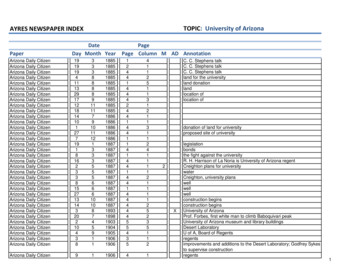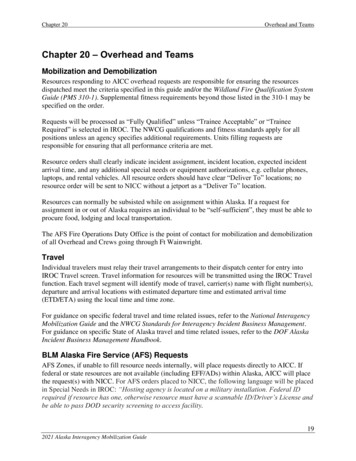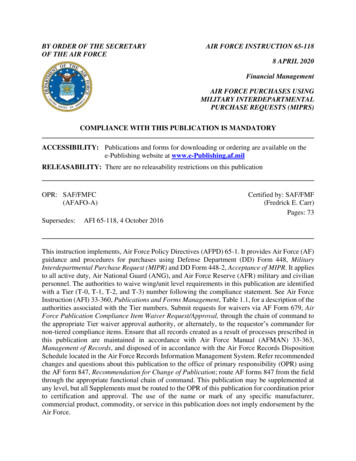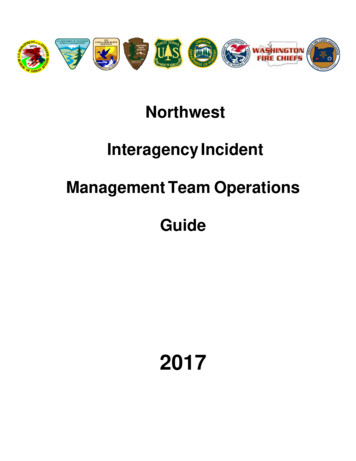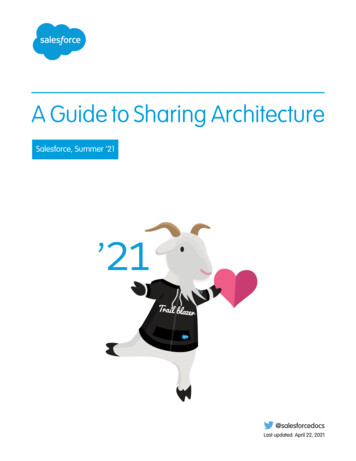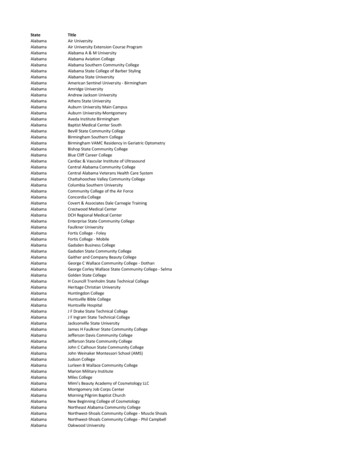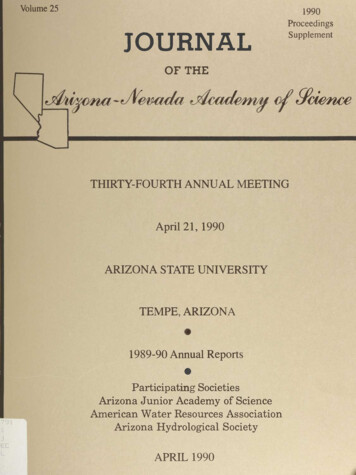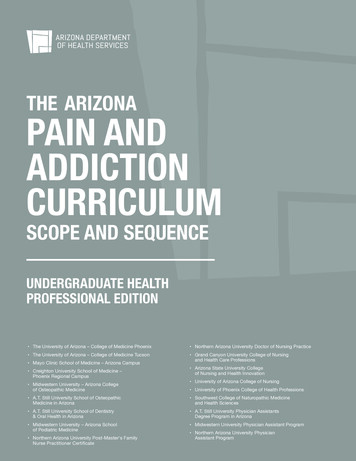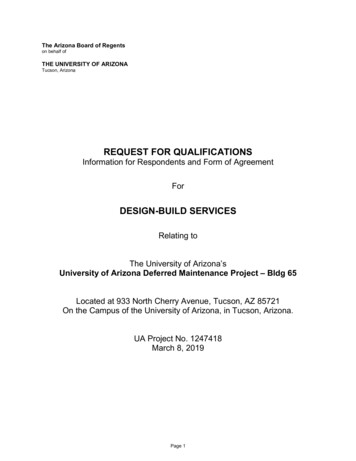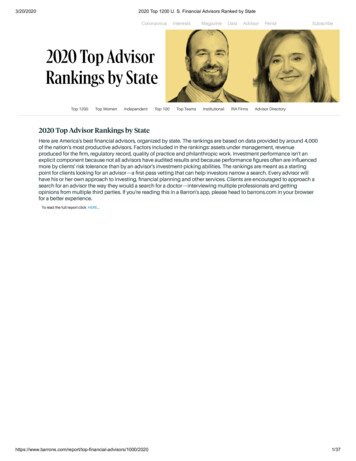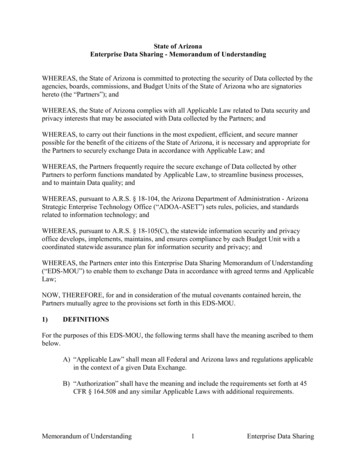
Transcription
State of ArizonaEnterprise Data Sharing - Memorandum of UnderstandingWHEREAS, the State of Arizona is committed to protecting the security of Data collected by theagencies, boards, commissions, and Budget Units of the State of Arizona who are signatorieshereto (the “Partners”); andWHEREAS, the State of Arizona complies with all Applicable Law related to Data security andprivacy interests that may be associated with Data collected by the Partners; andWHEREAS, to carry out their functions in the most expedient, efficient, and secure mannerpossible for the benefit of the citizens of the State of Arizona, it is necessary and appropriate forthe Partners to securely exchange Data in accordance with Applicable Law; andWHEREAS, the Partners frequently require the secure exchange of Data collected by otherPartners to perform functions mandated by Applicable Law, to streamline business processes,and to maintain Data quality; andWHEREAS, pursuant to A.R.S. § 18-104, the Arizona Department of Administration - ArizonaStrategic Enterprise Technology Office (“ADOA-ASET”) sets rules, policies, and standardsrelated to information technology; andWHEREAS, pursuant to A.R.S. § 18-105(C), the statewide information security and privacyoffice develops, implements, maintains, and ensures compliance by each Budget Unit with acoordinated statewide assurance plan for information security and privacy; andWHEREAS, the Partners enter into this Enterprise Data Sharing Memorandum of Understanding(“EDS-MOU”) to enable them to exchange Data in accordance with agreed terms and ApplicableLaw;NOW, THEREFORE, for and in consideration of the mutual covenants contained herein, thePartners mutually agree to the provisions set forth in this EDS-MOU.1)DEFINITIONSFor the purposes of this EDS-MOU, the following terms shall have the meaning ascribed to thembelow.A) “Applicable Law” shall mean all Federal and Arizona laws and regulations applicablein the context of a given Data Exchange.B) “Authorization” shall have the meaning and include the requirements set forth at 45CFR § 164.508 and any similar Applicable Laws with additional requirements.Memorandum of Understanding1Enterprise Data Sharing
C) “Breach” shall mean all known incidents that result in the unauthorized access, use,or disclosure of Data protected by federal or state laws.D) “Budget Unit” shall have the meaning set forth in A.R.S. § 18-101.E) “Data” shall mean information in any form that refers to, represents or describesentities such as conditions, ideas, objects, persons, events, transactions, and for thepurposes of this agreement, includes personal, confidential, private and public Data.F) “Data Exchange” shall mean a specific instance or case of Data Sharing.G) “Data Exchange Service” shall mean any System that serves to exchange Databetween Partners.H) “Data Request” shall mean a request for Data made by one Partner to another.I) “Data Sharing” shall mean the exchange of Data or information between two entitiesby any means.J) “Data Sharing Agreement” or “DSA” shall refer to a contractual agreement betweentwo or more partners delineating the terms and conditions of a specific DataExchange.K) “Data Transmittal” shall mean an electronic exchange of Data between Partners usingagreed upon Specifications.L) “Designated Representative” shall mean the individual chosen by a Partner to beresponsible for all communications related to this EDS-MOU between that Partnerand other Partners.M) “Discloser” shall mean a Partner that discloses Data to another Partner through a DataTransmittal in any format.N) “Dispute” shall mean any controversy or disagreement arising out of, or relating to,this EDS-MOU.O) “Effective Date” shall mean the date of execution of this EDS-MOU by a givenPartner.P) “Emergent Specifications” shall mean new technical Specifications that existingand/or potential Partners are considering to implement to test the feasibility ofemerging technology, to identify whether the Specifications reflect an appropriatecapability for the Partners, and assess whether the Specifications are sufficient to addas a production capability available to the Partners.Memorandum of Understanding2Enterprise Data Sharing
Q) “Information Technology Service Provider” or “ITSP” shall mean an organizationthat provides a Partner with operational, technical, cloud or other informationtechnology services.R) “Interoperability” has the same meaning as provided in P4440.S) “Notice” shall mean a communication sent to the Designated Representative of aPartner in accordance with this EDS-MOU.T) “Partner” shall mean an agency, board, commission or Budget Unit of the State ofArizona that is a signatory to this EDS-MOU, and includes an ITSP or contractorworking specifically for a Partner.U) “Personally Identifiable Information” or “PII” is information which can be used on itsown or in combination with other information to identify a specific individual.V) “Recipient” shall mean the Partner and any other person or entity that receives or hasaccess to the Data through a Data Transmittal from a Discloser pursuant to this EDSMOU.W) “Re-Identification” shall mean the reverse engineering of events or Data elements forthe purpose of permitting an individual to be uniquely identified after Data has beende-identified.X) “Specification” shall mean the provisions established by Applicable Law or adoptedby the SDIC that prescribe the Data content, technical, and security requirementsneeded to enable the Partners to Transmit Data. Specifications may include, but arenot limited to, specific standards, services, and policies applicable to Data Transmittalpursuant to this EDS-MOU.Y) “Subject Person” shall mean a natural person whose Data is maintained by a Partnerand is subject to exchange with another Partner.Z) “System” shall mean the software, portal, platform, or other electronic mediumcontrolled by a Partner through which the Partner conducts its Data Transmittalrelated activities. For purposes of this definition, it shall not matter whether thePartner controls the software, portal, platform, or medium through ownership, lease,license, or otherwise.AA) “Transmit”, “Transmittal”, or “Transmitting” shall mean, in varying tenses, to sendData electronically using the Specifications.BB) “User” shall mean any employee or contractor of a Partner who has been authorizedto access the Data.Memorandum of Understanding3Enterprise Data Sharing
2)PRINCIPLESA) The following Statewide Information Security Policies (“Security Policies”) andStandards (“Standards”), which may be amended from time to time, are incorporatedherein by reference and the Partners hereby acknowledge their responsibility tocomply with these Security Policies and Standards as then in effect:a) National Institute of Standards and Technology (NIST) SP800-53 R4b) Arizona Baseline Infrastructure Security Controlsc) P8110 Data Classification Policyd) P8120 Information Security Program Policye) S8120 Information Security Program Standardf) P8130 System Security Acquisition and Development Policyg) P8210 Security Awareness and Training Policyh) S8210 Security Awareness Training and Education Standardi) P8220 System Security Maintenance Policyj) S8220 System Security Maintenance Standardk) P8230 Contingency Planning Policyl) P8240 Incident Response Planning Policym) S8240 Incident Response Planning Standardn) P8250 Media Protection Policyo) S8250 Media Protection Standardp) P8260 Physical Security Protections Policyq) P8270 Personnel Security Controls Policyr) P8280 Acceptable Use Policys) P8310 Account Management Policyt) P8320 Access Controls Policyu) S8320 Access Controls Standardv) P8330 System Security Audit Policyw) S8330 System Security Audit Standardx) P8340 Identification and Authentication Policyy) S8340 Identification and Authentication Standardz) P8350 System and Communication Protections Policyaa) S8350 System and Communication Protections Standardbb) P8410 System Privacy PolicyB) The following Statewide Data Governance Policies (“Data Governance Policies”),which may be amended from time to time, are incorporated herein by reference andthe Partners hereby acknowledge their responsibility to comply with these DataGovernance Policies as then in effect:a) P4400 Data Governance Organization Policyb) P4430 Data Governance Technology Policyc) P4440 Data Governance Data Interoperability Policyd) P4470 Data Governance Documentation PolicyC) The purposes of this EDS-MOU are:Memorandum of Understanding4Enterprise Data Sharing
a) To facilitate Interoperability of Data between the Partners; andb) To enable Partners to exchange information with other Partners upon request, tofacilitate such exchanges, remove barriers to such exchanges, and provide agovernance framework to determine how Data Sharing occurs between Partners.D) The Partners hereby agree to the overarching principle that any and all Data in theircustody may be shared within their agency and with another Partners for a validpurpose unless at least one of the following is true:a) A contractual agreement with a third party explicitly prohibits sharing it withanother Partner; orb) Sharing of the specific Data is prohibited by Applicable Law; orc) Sharing of the specific Data would negatively impact operational or safetyactivities.E) A contractual agreement or Applicable Law that restricts the manner in which Data isshared, restricts specific Data elements that may be shared, or restricts re-sharing ofthe Data shall not be deemed to be a blanket prohibition from sharing the Data set.F) The Partners agree that Re-Identification of Obfuscated or De-Identified PII is notpermissible and will take steps to train personnel and implement countermeasures toprevent this from happening.G) Each Partner shall comply with State Data Security and Privacy policies, ApplicableLaw, this EDS-MOU, and all applicable Specifications in Transmittal of Data.3)STATE DATA INTEROPERABILITY COUNCILA) The Partners hereby agree to form a State Data Interoperability Council (“SDIC”).B) The SDIC shall be comprised of one member from each of the Partners. If the Partnerhas established a Data Policy Council in accordance with Policy P4400 (DataGovernance Organization Policy) then that body shall elect a member to the SDIC.C) The SDIC shall be chaired (“Chairperson”) by the State Chief Data Officer, if one hasbeen appointed, or a person designated by the State Chief Information Officer(“SCIO”).D) Motions shall be passed by a simple majority of the members present and voting.E) A quorum is comprised of one third of the registered members who are present inperson, telephonically, or through video conference.F) Members may send a proxy to attend and vote on SDIC items in their absence.G) The SDIC shall schedule regular meetings not less than quarterly, or more frequentlyas necessary or at the call of the Chairperson or designee.Memorandum of Understanding5Enterprise Data Sharing
H) The SDIC shall be responsible for the following:a) Supporting secure Data Transmittal;b) Maintaining a list of all EDS-MOU Partners, their Designated Representative(s)and their preferred contact information, which shall be made available to all EDSMOU Partners;c) Mediating Disputes between Partners with legal and compliance issues;d) Advising the SCIO or designee as to how to resolve Disputes between Partners inaccordance with this EDS-MOU;e) Managing amendments to this EDS-MOU; andf) Fulfilling other responsibilities related to Data Interoperability delegated by theSCIO or designee to the SDIC.I)4)Mediation Process for Disputes A Partner may request that the Chairpersonconvene a special meeting of the SDIC for purposes of mediating a dispute withanother Partner(s) related to Data Sharing. If the Chairperson grants such arequest, a special meeting of the SDIC shall be scheduled as soon as practicable.When holding a special meeting for purposes of mediating a dispute betweenPartners, members of the SDIC may provide non-binding recommendations as tohow the Partners in dispute should proceed toward a resolution.USE OF DATAA) Partners shall Request and Transmit Data in accordance with Applicable Law.Partners shall enforce this provision and the DSA with its Users, employees, vendorsand any other person or entity that receives, sends, or has access to Data pursuant tothis EDS-MOU.B) Recipients shall retain and use Data in accordance with Applicable Law, the DSA andthe Recipient’s record retention policies and procedures.C) Recipients shall not disclose Data to any outside entity or person, includingsubcontractors, unless such disclosure is explicitly permitted in the DSA.D) Each Partner certifies that unless permitted or required to share Data by ApplicableLaw, it has obtained a Uniform Authorization to Exchange Information (UAEI),which permits it to disclose Data for the Subject Person served by the Partner forwhom an inquiry is made pursuant to this EDS-MOU. If the Partner does not have asigned UAEI, but has a previously signed Authorization in a different form, theprevious Authorization may be sufficient until the UAEI is signed. SuchAuthorization may be included as part of the Subject Person’s application form or itmay be a separate consent to release form, which shall be kept in the Subject Person’sfile. In either case, the Subject Person must sign the Authorization, or where theSubject Person is a minor, the Subject Person’s parent or legal guardian. If theSubject Person has a representative authorized to act on his or her behalf, therepresentative may sign the release.Memorandum of Understanding6Enterprise Data Sharing
5)EXPECTATIONS, DUTIES, AND RESPONSIBILITIES OF PARTNERSA) All Partners shall collaborate with other Partners and shall respond to a Data Requestfrom another Partner in the affirmative, unless specifically prohibited in accordancewith Paragraph 2D. [Amended 8-15-2019]B) A Partner making a Data Request shall submit the request to the DesignatedRepresentative of the Partner from which the requested Data originates, who shallprovide a response approving or denying the Data Request within ten (10) businessdays by either:a) Requesting, in writing, a one-time extension of the time to approve or deny therequest by no more than 10 additional days,b) Approving, the Data Request in writing, orc) Providing a written denial of the Data Request, accompanied by a statementexplaining the specific legal authority requiring the denial.d) Partners may agree to further extensions of the time to respond not to exceed 45days in total from the date of the request. In the event that the responding Partnerrequires additional time to respond, the Parties may agree to extend the timefurther to avoid a denial. [Amended 8-15-2019]C) If the Data Transmission to Partners is specifically prohibited by Applicable Law orby operational or security concerns, Partners shall work to identify if any edits,deletions or additional protections can be made to comply with Applicable Law andallow Data to be provided to a Partner.D) Each Partner shall be responsible for maintaining a secure environment compliantwith State security policies, standards and guidelines, and other Applicable Law.E) Partners shall use appropriate safeguards to prevent use or disclosure of Data otherthan as permitted by the DSA and Applicable Law, including appropriateadministrative, physical, and technical safeguards that protect the confidentiality,integrity, and availability of that Data. Appropriate safeguards shall be those requiredby Applicable Law and the State Data Security and Privacy Policies and Standards.F) Each Partner agrees to have written privacy and security policies, including Accessand Disclosure Policies, in place before the Partner’s Effective Date, meeting StateSecurity Policies based on NIST 800-53 rev. 4.G) Each Partner agrees to employ security controls so that Data Transmittal will notintroduce any viruses, worms, unauthorized cookies, Trojans, malicious software,malware or Data designed to disrupt the proper operation of a System or defeat anyState or Partner security controls.H) Agreements with Users. Each Partner shall have established agreements with each ofits Users that require the User to, at a minimum:Memorandum of Understanding7Enterprise Data Sharing
a)b)c)d)e)f)g)h)i)Comply with all Applicable Law;Cooperate with Partners on issues, tasks and requests related to this EDS-MOU;Transmit Data only for a permitted purpose;Use and disclose Data received from another Partner or User only in accordancewith the terms and conditions of this EDS-MOU;Within 24 hours after determining that a Breach occurred, User will report suchBreach to the SCIO or designee and the State’s CISO, and follow the Partner’sinternal reporting procedures;Refrain from disclosing to any other person any passwords or other securitymeasures issued to the User by the Partner;Sign the User Acknowledgement form found in Attachment D; andCooperate with any external audits.With respect to Users who are employed by a Partner or who have agreementswith the Partner which became effective prior to the Effective Date, compliancewith this Section may be satisfied through written policies and procedures thataddress items (a) through (h) of this Section.I) Agreements with Vendors. To the extent that a Partner uses vendors in connectionwith the Partner’s Transmittal of Data, each Partner affirms that it has establishedagreements with each of its vendors, including ITSPs, that require the vendor to, at aminimum:a) Comply with Applicable Law;b) Protect the privacy and security of any Data to which it has access;c) As soon as reasonably practicable after determining that a Breach occurred, reportsuch Breach to the Partner;d) Not to re-disclose information without written consent of the Partner;e) Use information only for the purposes for which it was made available under theBusiness Purposes provided in the Specifications;f) Agree to the same restrictions on the access, use, and disclosure of Data ascontained herein;g) Cooperate with the other Partners to this EDS-MOU on issues, tasks and requestsrelated to this EDS-MOU;h) Sign the User Acknowledgement form found in Attachment D; andi) Cooperate with any external audits.J) Upon termination of a Data Exchange Service the Recipient shall:a) Transfer Data back to the Discloser and take any additional steps specified in theDSA and Specifications;b) Purge all Data in its possession, including all Data residing on computerhardware, cloud services, magnetic or optical media and paper. This purge shallbe performed in the manner set forth in the requirements for “Purge” contained inNIST SP800-88, Appendix A: Minimum Sanitization Recommendation for MediaContaining Data.”Memorandum of Understanding8Enterprise Data Sharing
6)TERM OF THE AGREEMENT; ADDITION OF PARTNERSA) This Agreement will take effect upon execution and will remain in full force andeffect perpetually throughout the existence of the Partners, unless terminated byStatute or Rule.B) If a Partner is transferred, subsumed or merged with another State Budget Unit byStatute, Rule or Executive Order then the successor Budget Unit shall remain boundby the terms of this agreement unless such statute or order specifically prohibits it.C) Agencies, boards, commissions, and Budget Units of the State of Arizona mayrequest to join this EDS-MOU and become a Partner.D) When an Applicant requests to join this EDS-MOU, the request shall be directed tothe Chairperson of the SDIC in writing. The SDIC shall review the request to ensureit conforms to the requirements of the EDS-MOU.E) The Chairperson shall place the approval of the Application on the agenda of the nextscheduled SDIC meeting.F) If the SDIC approves the Application, the Applicant shall execute this EDS-MOUand assume all the obligations and privileges of a Partner.G) The Chairperson of the SDIC shall forward the approval of the new Partner to theSCIO or designee, the new Partner’s Designated Representative, and Chief ExecutiveOfficer.H) If the SDIC does not approve the Applicant’s request to become an EDS-MOUPartner, the SDIC will so advise the Applicant, with specific reasoning as to why theyare precluded from participation.7)PROCESS TO AMEND THE EDS-MOUA) Any Partner may submit in writing to the SDIC Chairperson a request for anamendment to the EDS-MOU. All requests for proposed amendments shall identify:a) The section of the EDS-MOU that is the subject of the requested amendment;b) A description of why the requested amendment is desired;c) The proposed language for the requested amendment; andd) An analysis of the expected impact of the requested amendment.B) Upon receipt of a request for amendment the SDIC Chairperson shall place the itemfor consideration on the agenda for an upcoming meeting.C) Members may vote to defer consideration of an amendment to a future meeting if itrequires further deliberation or study. [Amended 8-15-2019]Memorandum of Understanding9Enterprise Data Sharing
D) The Amendment shall be approved by a ⅔ vote of the members present and voting.[Amended 8-15-2019]E) If the SDIC approves the amendment, the SDIC Chairperson shall forward theamended text to all members. [Amended 8-15-2019]F) A member who objects to the amendment may submit a new request for amendmentto the Chairperson, or, at their option, may withdraw from the Memorandum ofUnderstanding. [Amended 8-15-2019]G) EDS-MOU Signatories hereby delegate authority to their designated agencyrepresentatives to act on their behalf in this amendment process. [Amended 8-152019]8) INITIATING NEW DATA EXCHANGE, DATA SHARING AGREEMENT ANDSPECIFICATIONSThe DSA shall articulate the following details with respect to the specific Data being exchanged,either in the body of the DSA or in attachments referenced within the DSA:A) The business purpose of the Data Exchange;B) Applicable Law that permits or mandates the Data Exchange;C) Applicable Law that restricts the use of the Data being exchanged in any way;D) Permitted use of the Data;E) Permitted retention period of the Data;F) Steps to take at the expiration of the retention period to destroy or return Data to theDiscloser;G) Permitted sharing of the Data with third parties;H) An explanation as to whether an existing Interoperability standard is being applied,such as an internal standard, HL7, NIEM, etc. If the Data service does not follow anapproved standard, or there is no standard, specify this as well.I) An evaluation of whether additional Partner-specific restrictions should be applied onthe Data Exchange. User or Group level restrictions shall be included, if applicable.J) The Privacy Classification of the Data, which defines special security considerationsto be applied to a Data element. Examples include: PII – Personally Identifiable Information PHI – Protected Health Information MH/BH – PHI with additional protections – treat as mental/behavioral healthData PCI – Payment Card IndustryMemorandum of UnderstandingSharing10Enterprise Data
SSA – Treat as SSN content under Arizona and federal legislation EDUCATION – Treat as educational Data, subject to FERPA (FamilyEducational Rights and Privacy Act) SUBSTANCE ABUSE – PHI with additional protections – treat as substanceabuse information under federal lawK) The technical Specifications for the Data, including:a) Data elements and description of each;b) File format (CSV, Tab, flat, XML, JSON, etc.)c) Required metadata such as row count, file totals, layout version, privacyindicators, etc.d) Reference Data version and last update identifiers (ICD10, CPT, etc.)e) List of valid values for internal reference Data (department, division, agency, etc.)f) How to identify changed rows;g) Data types;h) Precision of numeric and GIS Data;i) Special formatting – identifies special formatting that should be applied to thefield content by the Partner consuming the service. Example patterns include: (###) – field value must be numeric up to 999. (###.##) – field value must be numeric up to 999 and allows 2 digits ofdecimal precision (0) – field value must be between 0 and 9; zero will be treated as a default ( ##.####) – field value must be up to 99.99; fractional parts of a dollar willpreserve ten and one digits by retaining a zero. (MM/DD/YYYY) – field value will be treated as a multi-part date field (APPROVED REJECTED PENDED) – field value must be one of the allowedvalues listed.L) The Service Level Agreement for Data deliveries (Data available by 4AM, etc.). Ifthe Data Exchange is mission-critical and requires high availability, this shall bestated in the Agreement;M) Frequency and schedule of transmission (weekly, 1st Thursday of each month, etc.);N) Period of time covered by each transmission (full replacement, last 7 daystransactions, etc.);O) Delivery mechanism (FTP/SFTP pull/push, web service, API, etc.);P) A process for restarting the service should the transfer fail unexpectedly;Q) Test procedures and pass/fail criteria;R) Details on the Data transfer process, including:a) Tracing the business path of the Data transfer from the source System to the targetlocation;Memorandum of UnderstandingSharing11Enterprise Data
b) Identifying if any updates or transformations are made to the Data in transit;c) Capturing details on the transport protocol that will be applied transferring theData;d) Noting if the transport protocol changes along the path; ande) Indicating the transfer/transmittal protection requirements to ensure the Datacontent is protected appropriately per Applicable Law.S) Starting and ending dates;T) The time period in which the Data remains valid and relevant;U) Any requirements for citations of the Data and credit for its use;V) Any disclaimers required on reports and other artifacts generated from the Data;W) Validation routines that will ensure that message format and content are valid and thatcontent has been received without error;X) A statement from the Discloser that describes the fitness for use of the Data, or adisclaimer that they are not responsible for the fitness for use;Y) Source of the Data – identify where the Data originated from, to help the userunderstand how to interpret the Data values, how to protect the Data and how theData can be used. Example sources include:a) Citizen –was provided by a Citizen or Userb) Partner – sourced from a State Agency, either active or inactive with theExchangec) 3rd party –is provided by an external third party entity, not affiliated with anystate Agencyd) SSA – field content came from the Social Security Administratione) IRS – field content came from the Internal Revenue Servicef) CMS - field content came from the Centers for Medicare and Medicaid Services;Z) The Origin of the Data, which serves to clarify the applicable business functionsallowed with the Data content and further defines the source of the Data including theSystem, application and Data field which were the source of the content; andAA) A feedback mechanism to report erroneous Data back to the Discloser for correctionand reprocessing.9)MISCELLANEOUSA) Notices. All Notices to be made under this EDS-MOU shall be given in writing to theauthorized Partner’s representative at the address listed with the SDIC, and shall bedeemed given:Memorandum of UnderstandingSharing12Enterprise Data
a) Upon delivery, if personally delivered or through the State’s inter-agency mailservice;b) Upon the date indicated on the return receipt, when sent by the United StatesPostal Service Certified Mail, return receipt requested; andc) If by electronic Transmittal, upon the date and time of sending the Notice isdirected to an electronic mail address listed with the SDIC.B) Governing Law. This EDS-MOU shall be governed by and construed in accordancewith the laws of the State of Arizona.C) Amendment. This EDS-MOU may be amended as provided herein. All Partners agreeto sign any amendment duly adopted in accordance with this EDS-MOU.D) Entire EDS-MOU. This EDS-MOU, together with all Appendices and Attachments,constitutes the entire agreement. The official, executed version of this EDS-MOUshall be maintained in an electronic form by the SCIO or designee. The SCIO ordesignee shall maintain the EDS-MOU is a format that is accessible to all EDS-MOUPartners.E) Validity of Provisions. In the event that any Section, or any part or portion of anySection of this EDS-MOU, is determined to be invalid, void or otherwiseunenforceable, each and every remaining Section or part or portion thereof shallremain in full force and effect.F) Priority. In the event of any conflict or inconsistency between a provision in the bodyof this EDS-MOU and any attachment hereto, the terms contained in the body of thisEDS-MOU shall prevail.G) Headings. The headings throughout this EDS-MOU are for reference purposes only,and the words contained therein may in no way be held to explain, modify, amplify,or aid in the interpretation or construction of meaning of the provisions of this EDSMOU. All references in this instrument to designated “Sections” and othersubdivisions are to the designated Sections and other subdivisions of this EDS-MOU.The words “herein,” “hereof,” “hereunder,” and other words of similar import refer tothis EDS-MOU as a whole and not to any particular Section or other subdivision.H) Relationship of the Partners. Nothing in this EDS-MOU shall be construed to create apartnership, agency relationship, or joint venture among the Partners. Neither theSDIC nor any Partner shall have any authority to bind or make commitments onbehalf of another Partner for any purpose, nor shall any such Partner hold itself out ashaving such authority. No Partner shall be held liable for the acts or omissions ofanother Partner.I) Effective Date. With respect to the first two Partners to this EDS-MOU, the EffectiveDate shall be the date on which the second Partner executes this EDS-MOU. For allMemorandum of UnderstandingSharin
coordinated statewide assurance plan for information security and privacy; and . WHEREAS, the Partners enter into this Enterprise Data Sharing Memorandum of Understanding . "Notice" shall mean a communication sent to the Designated Representative of a . P4440 Data Governance Data Interoperability Policy d) P4470 Data Governance .
